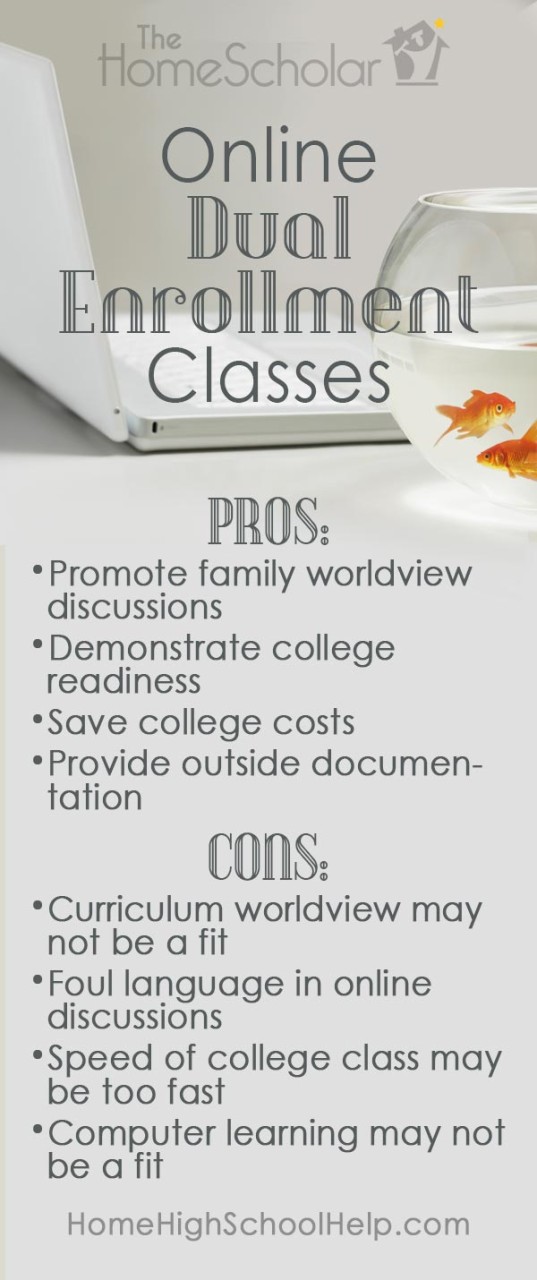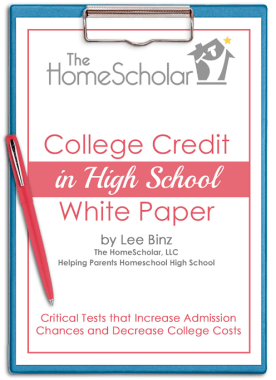Online Dual Enrollment for Homeschoolers
Dual enrollment for homeschoolers may save money on the cost of college, but is it worth it? Concurrent or dual enrollment can earn college credits during high school, which may shorten the time a student will spend in college so that parents pay fewer years of college costs. Online dual enrollment classes are available in many states, but, like anything else, have pros and cons. Before enrolling, become informed so you make wise decisions for and with your child.
On the positive side, taking online dual enrollment classes at home will allow the parent to talk through the various worldview and academic issues the child faces in real time, shaping and molding behavior much like we do when we are homeschooling. If your child is a poor test taker, success in college classes can demonstrate college readiness in a way that SAT® or ACT® tests can't. College classes while in high school can shorten the time spent at a college campus, saving parents thousands of dollars in the cost of a college degree. And the classes can provide outside documentation in subject areas that can improve scholarships.
Online dual enrollment is an option that many community colleges offer, and in many states, classes are free or significantly discounted for high school students. While in-person community college has some serious risks, online dual enrollment also has some pros and cons. The academic level of students may be lower than anticipated, because many students are remedial adults trying college for the first time. For example, students are often asked to grade each other's papers or work together on projects, which can be difficult if your cohort is at a significantly lower education level. It was difficult for my children to provide feedback to other students on their papers when they obviously struggled to write a paragraph.
The socialization of the online dual enrollment classes is similar to the in-person classrooms. During online chats and interactions, there may be foul language or surprising opinions. Not all classes have online chats, but some of them do. The worldview of the curriculum is the same as in-person classes, so it's often not a fit for parents that are in the "only Christian university" camp. It remains important to preview the textbook and inappropriate books, movies, or art may be required to succeed in class. The professor may incorporate shocking or profane material that they consider appropriate for an adult audience. Review the professor's past performance on RateMyProfessors.com.
There are some Christian colleges that offer online dual enrollment classes for a fee. As more universities adopt online course options, more are also offering online dual enrollment classes for high school students. You may find the perfect fit from these options:
It's also possible to earn college credit through CLEP® exams and AP® tests. I have a free ebook that will clearly explain those subject tests for homeschool parents. Download the eBook here: College Credit in High School: Critical Tests that Increase Admission Chances and Decrease College Costs
Worldview aside, however, there are other issues to consider with online dual enrollment. Because these are college classes, they go two or three times faster than high school courses. That can be too fast for some students to keep up with, particularly in their weak subject areas. Like all classrooms, the learning pace is constant, assembly-line style. If a student learns best in bursts rather than at a constant rate, that may not be a good fit. Failure in class is part of the permanent record, and the college transcript must be sent to colleges where you apply, so it's important to get good grades. Withdrawing from a class or earning an "Incomplete" are also permanently in the academic record, so it's important to see each class through to completion.
Another issue to consider is that the learning is done almost completely on the computer. The American Academy of Pediatrics recommends that students below age 18 limit their exposure online, including online learning. While popular, online learning is not "evidence-based," with little proof that it's an effective method of educating. It can cause young adults to be consumed into online behavior and follow online rabbit trails that can lead to the inadvertent discovery of the dark side of the web. For that reason, I always recommend keeping the computer facing public areas of your home, to help your child safely navigate the digital world.
Like almost every other area of homeschooling, this is an area where only the parent has all the information they need to make a decision about dual enrollment. My job is to make sure parents are aware of the pros and cons, so they can make an informed decision. As dual enrollment becomes more popular, there can be so much peer pressure to include this in homeschooling! Dual enrollment is not a requirement of homeschooling, but an option to consider.
When you subscribe to the blog, we will send you an e-mail when there are new updates on the site so you wouldn't miss them.

 Login
Login










.jpg)

Comments